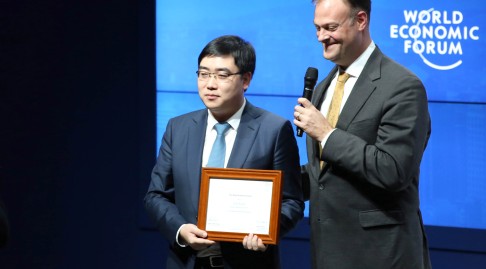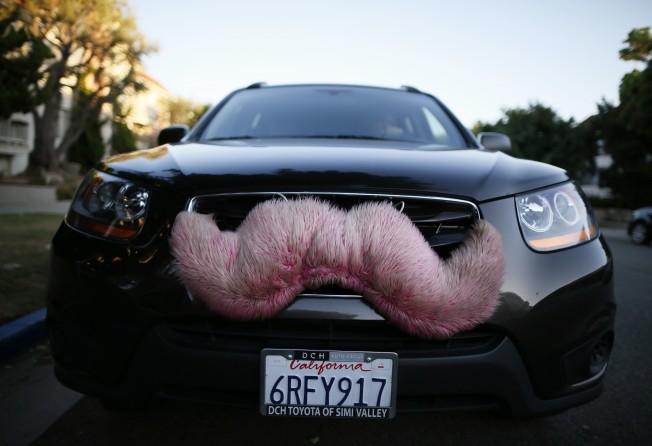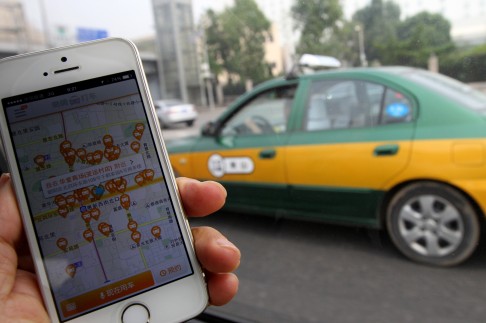
Ride-hailing app Didi Kuaidi invests US$100 million in Lyft so travelers in China, US can call cabs more easily on shared platform

Didi Kuaidi, operator of China’s top mobile ride-hailing platform, has invested US$100 million in United States-based on-demand transport provider Lyft to create a formidable alliance against fast-expanding, ride-hailing industry rival Uber.
Under their strategic partnership, Didi Kuaidi and Lyft will launch cross-platform interoperability so the two companies’ existing users can access local on-demand transportation services offered by each partner from their mobile apps when they are travelling in the US and mainland China.
The investment announced by the two partners on Wednesday in the US (Pacific Daylight Time) was part of the US$530-million financing round raised by Lyft in March, which included Chinese internet titans Alibaba Group and Tencent Holdings.
Cheng Wei, the chief executive at Didi Kuaidi, described the partnership with Lyft as a “groundbreaking collaboration”.
"Didi Kuaidi deeply admires Lyft's commitment to best serve their driver and passenger communities,” Cheng said.
“Like Lyft, we focus on activating the power of local resources and expertise in the true spirit of building a global sharing economy.”
The two companies expect their partnership to help improve users' international travel experience and boost each other’s global expansion plans.
Didi Kuaidi, which grew from the merger in February of Chinese taxi-hailing app operators Didi Dache and Kuaidi Dache, currently offers comprehensive transportation services in more than 360 Chinese cities.
It offers private car, carpooling, bus, chauffeur and taxi-hailing services to more than 200 million users in the country.
As it grows its portfolio of services, the company changed its logo last week as part of a rebranding exercise that was also aimed at distancing itself from the stigma of being an illegal taxi service amid a government crackdown in China on car-hailing apps and especially drivers without the correct permits.
It was also preparing to change the name of its main app from Didi Dache to Didi Chuxing - dache means "catch a cab" in Putonghua while chuxing has the broader meaning of "commute" - while replacing the old version of the app with a newer one, it said.
A backlash from established taxi companies in China, a number of which are government-backed, and protests from taxi drivers, who resent how the apps encroach on their business, has led to government raids this year on Uber's offices in Guangzhou, Sichuan's Chengdu and Hong Kong.
Moreover, this month the Chinese city of Shenzhen declared such apps' private-car services illegal. One driver for Didi Kuaidi in the city allegedly received a 100,000 yuan (US$15,710) fine for working for the app without the correct permit, the largest such fine to date in the country.
A handful of government ministries summoned senior representatives of the apps, both foreign and domestic, to a meeting recently and ordered them to comply with local laws within a certain timeframe as it moves to better regulate the industry.
Meanwhile, Lyft and Didi Kuaidi said in Wednesday's announcement they will push for in-depth collaboration between their technology and product development teams to improve their advanced algorithm systems and ride-matching capabilities.
“In today's ride-share environment, where every region presents a unique set of challenges and opportunities, partnering with the homegrown leader is the winning approach to Chinese expansion,” John Zimmer, the co-founder and president of Lyft, said.
The two companies will also share local knowledge and other business-related resources to explore new models for cross-platform and cross-regional market development.
Didi Kuaidi has plenty of resources to put into its expansion initiative with Lyft, after the Beijing-based company raised US$3 billion last week from its latest round of financing.
That financing was led by new investors China Investment Corp, Capital International Private Equity Fund, and Ping An Ventures, among others. Existing investors Alibaba, Tencent, Temasek and Coatue Management also participated in the round.
Uber, which is based in San Francisco like Lyft, recently raised a comparatively smaller US$1.2 billion financing for its China operation from investors, including online search giant Baidu.
Travis Kalanick, the chief executive at Uber, said his company was now handling 1 million rides a day in China and that it plans to operate in 100 more cities in the country from 20 at present.
